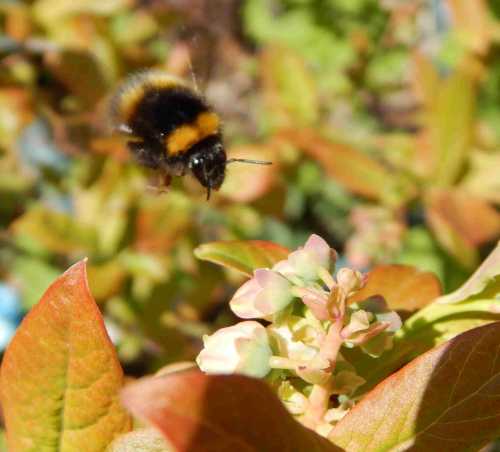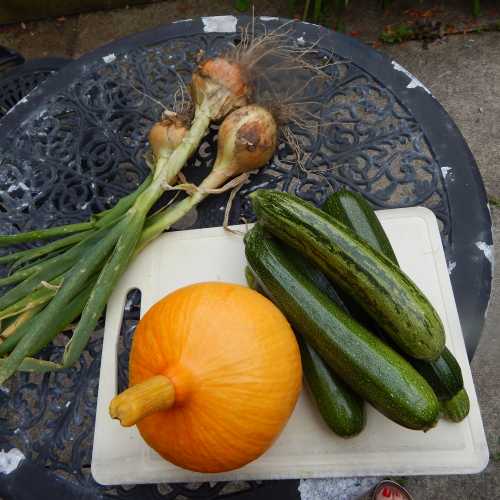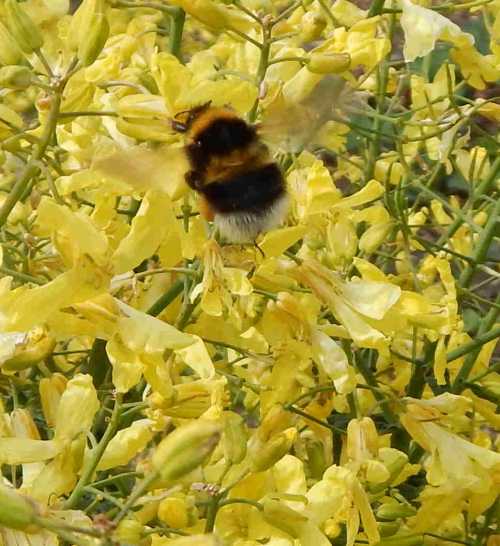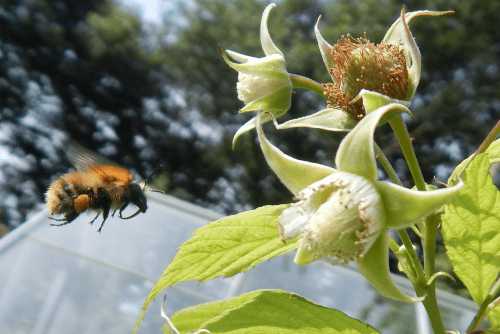If Bees Disappear, Will We Starve?
Is it true that if bees die, we die?
Do we really need bees to grow food?
With the publicity surrounding bee decline, these are common questions. People are asking themselves how much we need to be concerned. I sometimes get asked these questions, among others, such as:
- "Can other insects step in to perform the
function of bees, in pollinating our food crops as well as flowers and
trees?"
- "Can't we just switch to other foods?"
Let’s tackle these questions.
Can other insects step in to do the pollinating in place of bees?
 Bumble bee flying toward blueberry flower.
Bumble bee flying toward blueberry flower.Not necessarily. It depends.
1. Some crops may rely primarily on bees
Not only this, but some crops are reliant on a particular species. For example, almond growers rely heavily on the honey bee. Without honey bees, almond crops would suffer.
Sometimes, a crop may have multiple insect pollinators, but bees are the most efficient. This is the case with water melons, for example.
However, not all crops rely on bees only - other insects can also help, and some crops are pollinated via other methods such as wind pollination.
2. Environmental factors affecting bees are likely to affect other wild pollinators
Habitat loss and pollution affect many invertebrates and wild pollinators, as well as bees.
In other words, environmental causes of bee decline, are likely to affect other wild pollinator species too.
For example, hand pollination by humans in regions of China occurs largely because both bees and other wild pollinators have been poisoned by insecticides.
One study noted that:
"About 4 decades of pesticide sprays by the farmers, 8 to 10 sprays of pesticides per season, have contributed to a serious decline in pollinators."
See also: Worldwide Insect Decline.
If there are no bees - or even other pollinators, can't we just eat something else?
 Pumpkins, onions, courgettes are pollinated by bees.
Pumpkins, onions, courgettes are pollinated by bees.
It is generally proposed that bees are responsible for a third of the food we eat, but it's not always easy to work out how this figure was calculated.
 Bumble bee pollinating kale flowers - this will help to ensure seeds set.
Bumble bee pollinating kale flowers - this will help to ensure seeds set.
Nevertheless, it would seem obvious that if bees were to die out along with other pollinators, then this may strain supply of at least some food crops, especially various fruits, beans and pulses, some nuts.
But what about other foods?
Wind pollinated crops
Some crops are wind pollinated, such as grain. However, it is arguable that the most exciting - and health-giving parts of the human diet rely on bees and other pollinators - such as blueberries, blackberries, apples, pears, various other fruits and nuts plus vegetables.
Self-pollinating crops
Some crops can self pollinate, and do not rely on bees. However, even with some of those crops, insect pollination has often been proven to substantially increase crop yield, leading producers to encourage pollination by bees. Therefore, without bees there could be a strain on the supply of some foods due to reduced volume grown.
Fish
If bees die, along with other insect pollinators, we may be able to continue to eat fish. There are other species affecting fish of course, such as pollution of the oceans and over-fishing.
Poultry and eggs
Poultry and eggs would be little affected by demise in bees or other pollinators. They can eat grain, grasses and various soil organisms not reliant on pollination.
Meat
If you eat meat such as beef, then obviously meat is not pollinated by bees. However, to provide meat, an animal had to be fed, and many animals that are eaten, actually eat vegetation such as alfalfa (clover) which is pollinated by bees. Thus, bees help provide at least some of the food for cows, which in turn enables humans to eat beef.
It's possible that animals such as cows would simply have to stick with a diet that had no pollinator involvement, and would not be affected too much. Should a shortage occur, people would have to eat less meat, although this trend may have started already.
Conclusion: we don't really know what the effects would be!
- We cannot really know what the full impact might be. We can only develop theories, but we have surely learned enough to understand that nature is interconnected, and declines in some species will ultimately result in the loss of other species - and this includes plants.
- It's hard to believe that we would starve, but we might expect food shortages and rising food prices.
- Environmental factors harming bees may also indirectly affect food crops. For example, pesticides and intensive farming practices may impact upon soil quality and food crop productions.
- There are unknowns, such as indirect and subtle impacts on the wider food chain.
Wouldn't it be better to do all we can to reverse bee declines? Here are 10 things you can do.
If you found this page helpful or interesting, I'd really be grateful if you would share it with others - if not this page, perhaps another, such as Gardening For Bees.
Thank you so much :) .
